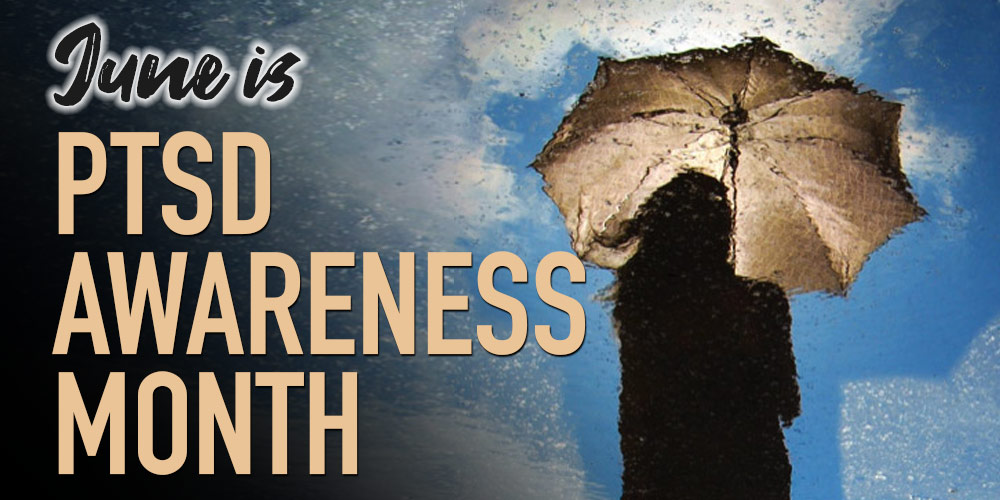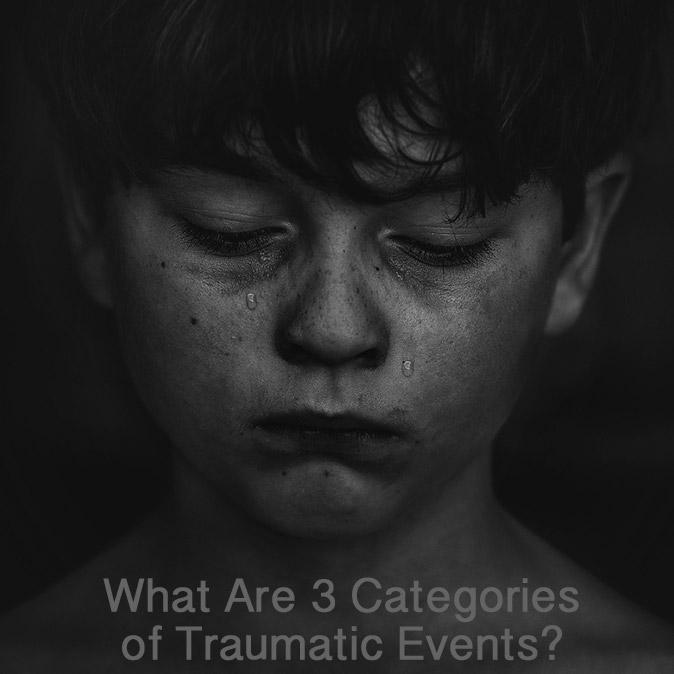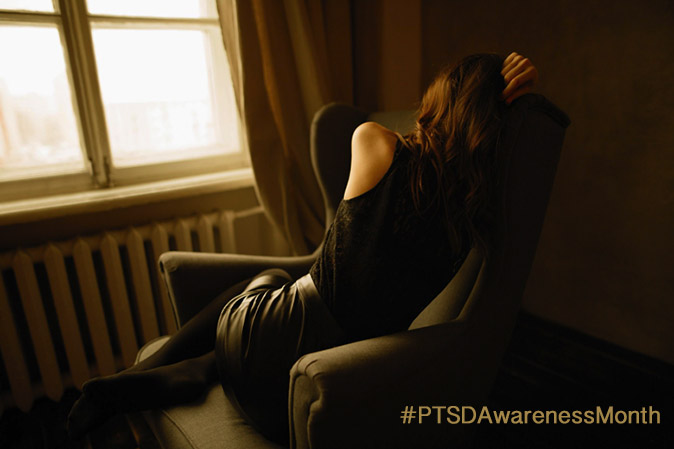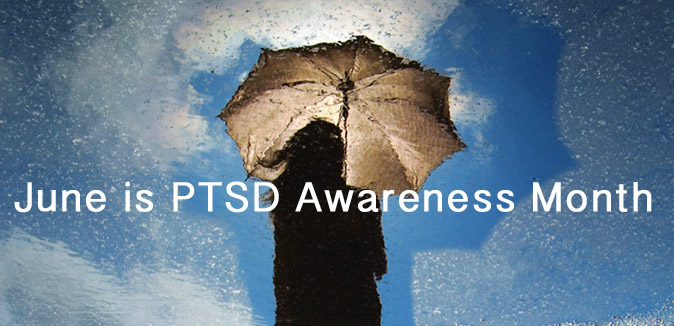
Because trauma impacts so many people, June is recognized every year as PTSD Awareness Month.
While some people are able to recover after a traumatic experience, many relive their worst moments over and over again.
Approximately 6 people out of a 100 will develop Post-Traumatic Stress Disorder (PTSD) at some point in their lives, and nearly 13 million Americans had PTSD in 2020.
To some people, these numbers may come as a surprise, but they are easier to comprehend when you understand the likelihood of experiencing a traumatic event.
In fact, 60% of men and 50% of women experience at least one traumatic event in their lives and many famous people with PTSD have been outspoken about their treatment and recovery.
In 2010, the United States Senate officially recognized June 27 as National PTSD Awareness Day.
Four years later in 2014, they extended the designation to include the entire month of June as PTSD Awareness Month.

What is Trauma and 3 Categories of Traumatic Events?
According to the American Psychological Association, trauma is defined as an emotional response to a terrible event like an accident, rape or natural disaster.
Traumatic events are broken down into three main categories:
1. Acute Trauma
Acute Trauma describes a type of trauma that results from a single incident. Incidents that could result in acute trauma include (but are not limited to):
- Car accident
- Theft
- Assault
- Witnessing a violent event
2. Chronic Trauma
Chronic Trauma refers to trauma that is prolonged and repeated. Incidents that could result in chronic trauma include (but are not limited to):
- Repeated physical or sexual abuse
- Domestic violence
- Living in a violent environment
- War or combat
3. Complex Trauma
Complex Trauma or Complex PTSD (CPTSD) includes exposure to varied and multiple traumatic events.
Like chronic trauma, complex trauma also results from prolonged and repeated traumatic events and can develop as a result of any of the incidents listed above.
However, complex trauma also includes another set of criteria including the following:
- The traumatic events were perpetrated by a trusted individual
- The traumatic events resulted in a sense of betrayal
- The traumatic events occurred during childhood
It’s important to recognize some of the most common CPTSD symptoms and to seek treatment when necessary.
Lesser-Known Traumatic Experiences
While abuse, war, and violent experiences are the most commonly recognized traumatic events, there are many incidents that may result in trauma.
Because of this, it’s important that we understand that everyone processes harmful incidents differently, and all experiences must be respected.
Here are some other experiences that may result in trauma:
- Misdiagnosis
- Childbirth
- Verbal abuse
- Bullying
- Gaslighting
- Medical malpractice
- Neglect
- Homelessness
- Psychiatric hospitalization
- Sibling abuse

What is Post-Traumatic Stress Disorder (PTSD)?
Post-Traumatic Stress Disorder (PTSD) is recognized as one of the main types of trauma disorders, along with Acute Stress and Adjustment Disorders, among others.
In addition to various trauma disorders, post-traumatic stress can be further categorized into different types of PTSD, and receiving a proper diagnosis is necessary for effectively treating the symptoms and experiencing lasting recovery.
It’s normal to feel distressed after a traumatic event. However, if symptoms occur for longer than a month and dramatically interfere with day-to-day life, a person may be experiencing PTSD.
There is no specific timeline for the onset of Post Traumatic Stress Disorder.
PTSD may be diagnosed as early as one month after the traumatic event or could appear years later. Regardless of the onset of PTSD, the symptoms can be debilitating for many people.
PTSD and Mental Health
It is not known why some people who experience trauma are able to adjust and cope while others develop symptoms of Post-Traumatic Stress Disorder.
As with most mental health issues, PTSD may develop in those with a genetic predisposition or as a result of the way the brain processes stress. It may be these same factors that put a person at risk for addiction.
It’s estimated that more than half of the people living with the disorder also have an issue with PTSD and addiction. Many of those experiencing PTSD turn to drugs and alcohol as a way to self-medicate, avoid painful memories, and attempt to manage stress.
However, using substances to numb the pain from trauma will magnify symptoms, delay treatment progress, and may ultimately make PTSD last longer.
Because co-occurring PTSD and substance use disorders feed off one another and make the symptoms worse, it’s essential to treat both conditions simultaneously with dual diagnosis treatment.
As a result of the stigma attached to addiction and mental health disorders, many people don’t seek the treatment they need to manage and overcome these growing health issues.
Everyone should understand that help is available, and there’s no shame in asking for help.
EMDR PTSD Treatment is a newer form of therapy that has shown to be quite effective for many people.
One of the core techniques of EMDR uses bilateral stimulation to activate both sides of the brain to reduce stress, anxiety, and uncomfortable memories.
June is PTSD Awareness Month
Two of the biggest misconceptions about PTSD are:
- PTSD is simply stress after trauma
- PTSD only happens to veterans
Sure, there is some validity to these statements, although they are both an oversimplification of the reality and statistics.
Everyone feels stress after a traumatic event, but that doesn’t signify it is related to PTSD.
And while many veterans do experience PTSD, it is something that impacts people from all walks of life, not just those who served in the military.

The goal of PTSD Awareness Month is to raise awareness that treatment is available and to help educate more people about the condition to dispel the stigma and misconceptions surrounding it.
The U.S. Department of Veteran’s Affairs National Center for PTSD website is an excellent resource for raising awareness.
The website includes information to share on social media, ways to partner with others to spread the word, and phone numbers and links to find help and treatment.
We can all do our part to shatter the stigma and help others understand treatment is available and works. No person should have to live their life in fear or secrecy about an illness that affects millions of people and is treatable.
Spread the message during PTSD Awareness Month in June and use the hashtag #PTSDAwarenessMonth.
Other PTSD Awareness Month Resources
The National Institute of Mental Health (NIMH) website has digital information about PTSD to help raise awareness.
The Mental Health Technology Transfer Center Network has a calendar of events and links to PTSD resources.
The youth.gov government website has resources for youth programs.
The book, “The Body Keeps the Score: Brain, Mind, and Body in the Healing of Trauma,” by Bessel van der Kolk M.D., is a New York Times bestseller that offers a vast amount of information about trauma, and outlines many types of effective treatment approaches. It is a must-read for anyone impacted by trauma.
Related Posts
- 5 Types of PTSD and Treatment Therapy
Anyone can experience post-traumatic stress disorder symptoms and recognizing the different types of PTSD will…
- 21 Movies About PTSD and Post-Traumatic Stress Disorder
June is PTSD Awareness Month, so it’s fitting to recognize some of the best movies…
- Somatic Experiencing Therapy for Trauma Healing
Trauma or PTSD can be debilitating for many people, but fortunately a form of Somatic…
